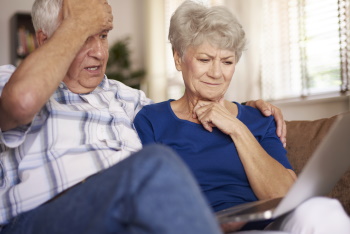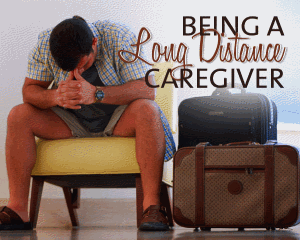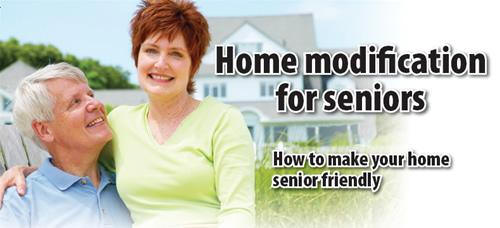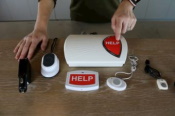Tips For Long Distance Caregivers
Caregiving From a Distance
If you live an hour or more away from a person who needs care, you are a long-distance caregiver. Long-distance care giving can take many forms - from helping manage the money to arranging for in-home care from providing some respite for the primary caregiver to helping a parent move to a new home or facility. As a result, a growing number of adult sons and daughters are discovering just how hard it is to try to ensure the welfare of aging parents who live hundreds, sometimes thousands, of miles away.
Many long-distance caregivers act as information coordinators, helping aging parents understand the confusing maze of home health aides, insurance benefits, and durable medical equipment. Families often also turn to the professional services of a Geriatric Care Manager as well.
Talk - Discuss - Learn!
Given the choice, most senior would prefer to continue to live in
their own homes known as"aging
in place". Unfortunately the majority of elderly people
gradually lose functioning ability and require either additional
assistance in the home or a move to an elder care facility.
The adult children of these elders often face a difficult
challenge in helping their parents make the right choices
especially if they live a distance away. This is why understanding
what elder care is, and what it involves, is so important.
Tips for Children with Aging
Parents
Talk, discuss, learn what services and elder care options are
available in the community BEFORE a situation or crisis arises.
 Learn About Elder Care
Options
Learn About Elder Care
Options
Elder care is so broad based.
It encompasses a wide variety of issues, including choosing an
appropriate geriatric
physician
to care for an aging patient, and making decisions about
moving an elderly person from the home environment to a
residential care setting.
Elder care can also mean arranging for an array of care services
such as adult day service,
assisted
living, Hospice, nursing
care and home
health. It
could also encompass arranging for in home care.
There are two types of in home care: Medical (skilled care) and Non-Medical.
In
home care includes a wide range of services that are
provided over an extended period of time to people who need help
to perform normal activities of daily living such as eating,
dressing and bathing because of cognitive impairment or loss of
muscular strength or control.
They may also need assistance with meal planning and
preparation, laundry, obtaining medical care, paying their bills
paid, senior transportation to and from their doctor appointments
as well as to the grocery store.
Home health care can include rehabilitative therapies,
skilled nursing care, palliative care, and social services, as
well as supervision and a wide range of supportive personal care
provided by family caregivers and/or home health care agencies.
Elder care can be long-term or short-term depending on the needs
and situation.
Modifying Your Home
Elder care can include modifying ones home to make it safer and
easier to remaining living there. Adaptations can include features
that make it easier and safer to manage activities of daily living
such as bathing, cooking, and stair climbing.
Home Modification for Aging in Place
Alterations to the physical structure of the home can improve its overall safety and condition. Home modification examples include installing grab bars and transfer benches in bathrooms, ramps, and handrails for home access.
There are also ways today to
convert the standard step-in bath tub, which can become a safety
hazard, to a new
'walk-in' type bath tub. Older adults may tend
not to bath as often as they should for fear of
falling. These type of home modifications can make a big
difference in making your loved ones home safer.
Medical
Alert Systems
Elder care can also include setting your loved one up with a
medical alert system. By doing so, everyone is given peace of mind
in knowing that if needed, emergency assistance is available at
the push of a button.
It's also a good idea to get the names and phone numbers of your
elder loves ones next door neighbor or close friend. In the event
you can't them by phone you can contact this person and ask them
go over and check on them for you, notify you and the authorities
should they find something not right. Be sure they have your
contact numbers too.
|
"Get Help
If You
Fall" Medical Alert System |
Aging is like taxes. It's guaranteed so it's always best to be as knowledgeable and prepared as one can, so when the time does arise, better more informed decisions are made. With aging comes a greater need for home care services, senior living communities, respite for the thousands of caregivers trying to work and care for an elder loved one.
Related Articles:
- Elderly Health Issues: Warning Signs for Long Distance Caregivers
- Roll Reversal: Parenting Your Parents
- VA Caregiver Support Program
- Support Groups for Caregivers: What They Are and How They Can Help
- Who Are Spousal Caregivers?
- Alzheimer's Caregiver Resources
- Family Caregiver Statistics
- Caregiving for a Stroke Survivor
Home | About | Articles | Resources | Site Map | Privacy Policy
Elder Options of Texas
Copyright 2001-2024
All Rights Reserved
DISCLAIMER: Links to other websites or references to products, services or publications do not imply the endorsement or approval of such websites, products, services or publications by Elder Options of Texas. The determination of the need for senior care services and the choice of a facility is an extremely important decision. Please make your own independent investigation.




